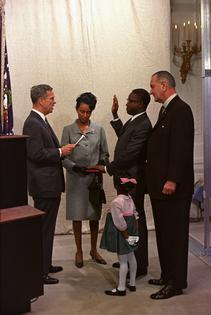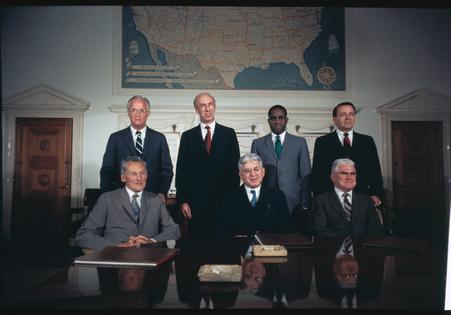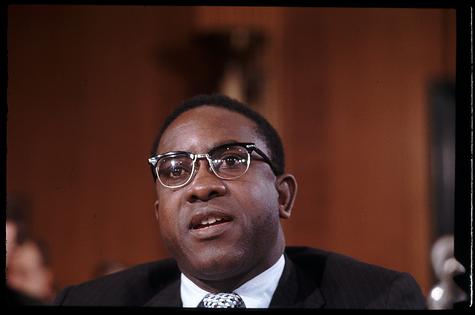Sudan’s war is wrecking a lot, including its central bank – a legacy of trailblazing African American economist and banker Andrew Brimmer
Published in Political News
The war in Sudan between two rival generals for control of the country is devastating in so many ways. Hundreds of civilians have been killed, thousands injured and more than 1 million people are now homeless. The fighting is even wreaking havoc on the country’s central bank.
In late April 2023, a video surfaced of a branch of the Central Bank of Sudan in Khartoum on fire. And on May 31, Sudan’s army bombed a central bank printing press to keep opposition forces from printing the money it needs to fund its fight.
What many people may not know is that, in 1956, three U.S. economists laid the groundwork for the Central Bank of Sudan. And Andrew Brimmer, the first African American to serve on the Board of Governors of the U.S. Federal Reserve System, was one of them.
Brimmer’s resume was replete with high-level appointments and other professional accomplishments. After his death in 2012, he was lauded as having demonstrated a deep concern for “the economic conditions of poor, powerless, uneducated black people.” That interest dated back to his own childhood in the Jim Crow South where he watched his father navigate a system stacked against Black people and his early work helping found the Central Bank of Sudan.
As an African American historian of Sudan, I have been drawn to the ways that Black Americans have participated in the development of modern Sudan. I’m particularly fascinated by the way Brimmer, a graduate of the University of Washington, where I teach, figures into this history.
My forthcoming book examines African American involvement in Sudan and their impact on this transnational relationship.
Brimmer was one of six children – three girls and three boys. His father alternated between manual jobs, from chopping cotton to shipping out grain to support the family, and his mother grew much of the food the family ate.
“So we were typically poor, but not dirt-poor,” Brimmer told interviewers for a Federal Reserve Board oral history project in 2007.
He was born in 1926 in Newellton, Louisiana, just five miles from the plantation where some of his ancestors had been enslaved. And he was educated in a segregated school system that had a shorter school year for Black children than white children and only went to the seventh grade. Brimmer had to leave town for additional education.
He was drafted into the Army near the end of World War II and was honorably discharged in 1946. Brimmer then earned undergraduate and graduate degrees in economics in 1950 and 1951 from the University of Washington and in 1957 earned a Ph.D. in economics from Harvard.
When Sudan became independent of British colonial rule in 1956, it established diplomatic relations with the United States and requested U.S. help in setting up a central bank.
That July, officials at the U.S. State Department asked Brimmer, who had been working as an economist with the Federal Reserve Bank of New York since June 1955, and two senior-level Federal Reserve members to participate in a technical mission to Sudan to help with that request.
Brimmer and his colleagues – Oliver Wheeler, vice president of the Federal Reserve Bank of San Francisco and head of the mission, and Alan Holmes, a senior economist and economic adviser at the Federal Reserve Bank of New York – arrived in Sudan in December 1956 and stayed until the following March.
Charged with developing a blueprint for a central bank, the team interviewed commercial bankers, government officials, business owners and community members before drafting a central bank charter. The document laid out the bank’s rights and authorized its operation. The government of Sudan established the central bank in July 1959 based on their work.
Brimmer’s diary from the trip — housed at Harvard University — offers a glimpse into some of his other experiences. He attended festivities marking Sudan’s first anniversary of independence and attended the first match of the inaugural African Cup of Nations soccer tournament.
He took pictures of the University of Khartoum and sites along the Blue Nile, and also attended a flower show by the Horticultural Society of the Sudan.
Perhaps his diary’s most interesting moments concern his recollection of how Sudanese perceived him. One woman, Brimmer wrote, “wanted to know why I could not speak Arabic!” She was apparently in disbelief that he was not Sudanese. “When I told her how I got to be in the U.S. and that she and I may be cousins, she laughed.”
Back in the U.S., Brimmer went on to work in the administrations of Presidents John F. Kennedy and Lyndon B. Johnson. And in a historic move, Johnson nominated him to the Federal Reserve Bank’s Board of Governors on Feb. 26, 1966. That body oversees the 12 Reserve banks in the system and works to promote a fair consumer financial services market.
After his Senate confirmation, Brimmer joined the board on March 9, 1966, becoming the first Black member in its history. There, he earned a reputation as the resident expert on international monetary policy.
He was also considered an authority on Black economic issues who often advocated for affirmative action, co-chaired the Interracial Council for Business Opportunity and argued that racial discrimination hurt the U.S. economy by effectively sidelining potentially productive workers. He also maintained that racial discrimination in education was responsible for Black people earning lower incomes than white people.
From his various wage analyses in the early 1970s, Brimmer determined that the median income for Black families was just over 60% of the median white family income.
“I do feel that the economic plight of blacks is a serious matter,” Brimmer said to The New York Times in 1973. “So I bring the same economist’s tool kit to that subject as other economists bring to examine other national economic problems.”
Brimmer resigned from the Fed in 1974 to teach at Harvard.
He went on to found his own consulting firm, led the Association for the Study of Afro American Life and History, which preserves and promotes information about African American culture, history and life, and served on Tuskegee University’s board of directors from 1965 to 2010.
When he died in 2012, The Washington Post noted that Brimmer used his position to warn about the economic dangers of racial discrimination and to call for broader educational opportunities in urban areas. That was unlike other members of the Federal Reserve Board.
This article is republished from The Conversation, an independent nonprofit news site dedicated to sharing ideas from academic experts. Like this article? Subscribe to our weekly newsletter.
Read more:
Sudan crisis explained: What’s behind the latest fighting and how it fits nation’s troubled past
Sudan’s plunge into chaos has geopolitical implications near and far – including for US strategic goals
Christopher Tounsel has previously received research funding from the Woodrow Wilson National Fellowship Foundation, Andrew W. Mellon Foundation, Social Science Research Council, Council of Overseas American Research Centers, and Doris G. Quinn Foundation.


































































Comments